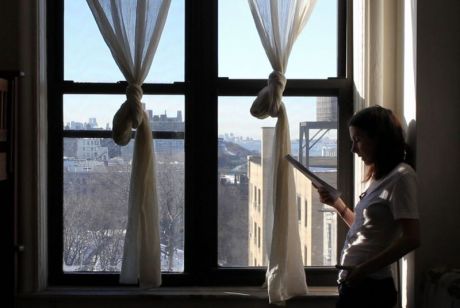“It’s a messaging device that delivers your SMS letter by letter over the course of the day…”
This is Carolyn Strauss, Director of slowLab, an organisation that studies and promotes ‘slow design’ as a positive catalyst for individual, social and environmental wellbeing. Carolyn is describing one of many slowLab projects that examines our fast-paced, capitalist society, and attempts to come up with ways to challenge materialistic values and improve our everyday experiences by resisting instant gratification.
In some ways I thought this idea was quite charming: almost like receiving a love letter or a birthday card, the SMS would be treated as something thoughtful and considered, possibly even poetic. However, I can also see how this could be pretty frustrating: if you’re waiting for directions to a meeting, or the result of a test, the last thing you need is a painful, day-long drip-feed of dull information!
Carolyn was speaking alongside three other experts at the Camden Arts Centre on Saturday, as part of a talk on ‘slowness in the digital age’, a key theme in Moyra Davey’s work on the everyday passing of time: ‘life without sheets of paper to be scribbled on is masterpiece’, currently on show at the centre.
Richard Kerridge, Director of Creative Writing at Bath Spa University, encouraged the audience to try ‘slow reading’. Richard described the technique as “a willingness to read with an openness in which there is a commitment to a long term engagement that will give (the text) the chance to answer back, repeatedly. This is an alternative to the rapid consumption of the text…” Richard argued that the regimented structure of our education system is partly to blame for students racing through texts, extracting a couple of quotes and then arranging them in a formulaic essay. Rather, we need the time and space to read and re-read, pause, reflect, and come to our own conclusions about the stories we read.
It’s also about accepting that life, and therefore stories about life, don’t normally fit into neat little structures. Richard said: “slow reading accepts and values the text’s resistance to interpretation, seeing this resistance as an opening out of space…we need to be willing to lose ourselves in the ‘nowness’ of reading, as an immersive experience, and pay explicit attention to the stages of decompression”.
Manu Bazzano, zen monk, writer and psychotherapist, noted that many people use speed and ‘busyness’ as a distraction. From his own experience of attending silent retreats, where time really does seem to slow down, there comes a point where fear sets in, as there are no external props or distractions to prevent you from simply sitting with your own experience, which can be tricky to deal with. Manu argued that we shouldn’t slow down our life experiences simply for the sake of slowness, rather we should find an ‘appropriate speed’ that serves us well – something all the panellists agreed on.
Marcus Verhagen, art historian and critic, discussed how we experience time when engaged with art. Marcus questioned whether works of art that clearly took a great deal of time, skill and precision to create encourage us to also take more time to pause, observe their beauty and decide for ourselves what meaning we can attribute to the work of art. I’m inclined to think yes: works that truly inspire wonder, like the Sistine Chapel in the Vatican, do seem to encourage people to be more reflective.
So should we all unplug our laptops, switch off our smartphones, and spend all our weekends in art galleries and silent retreats? Surely not. During the final Q&A with the audience, the idea that social media simply reflects our restless, distracted state of mind was raised. We choose to check our emails, Facebook walls and text messages several times a day…if these distractions weren’t available, surely our minds would simply latch onto something else? This relates to an idea that yoga and meditation experts have known for thousands of years: focus is a skill which requires disciplined practice. If we don’t train our minds to be calm and focused, through mindfulness or other practices, then we won’t cultivate these qualities.
Another member of the audience also pointed out that social media and the digital revolution have actually been hugely positive for our wellbeing, pointing to the Headspace app as an example of an online company bringing mindfulness techniques to a mass market. This is a very good point.
It’s also worth noting that without the digital revolution I wouldn’t have found out about this panel discussion today, or about the Headspace app. I wouldn’t have been able to find the Camden Arts Centre without buying a paper map. I wouldn’t be writing this blog post, and I wouldn’t have known about the new yoga class I went to this weekend, or been able to catch up with friends outside of London at the click of a mouse. The digital revolution has certainly given us a lot to be grateful for: but I agree with the panel experts in that we need to ensure that we approach it mindfully, and don’t allow it to distract us from what’s really important.

